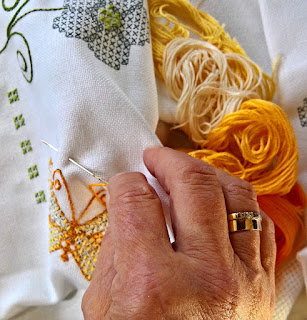Learning the basic hand sewing
techniques allows you to make changes in the garment designs and do small
projects. Although you might have a sewing machine, there will be times where
only a hand sewing can deliver the results you want. Through this article, you
will learn hand stitching techniques for Indian Garment Making.
Sew a Slip Stitch
A slip stitch is a common hem
stitch used in garment creation to
cover up the visible stitches. Follow the steps below to create a slip stitch.
●
Thread the needle and knot the end of the thread.
●
Then anchor the knot within the garment.
●
Pick up a few threads of the fabrics where the knot is anchored.
●
Now pull the needle through the fabric towards the hem edge.
●
Move the needle over and insert the seam into the hem edge. This
way the stitch stays under the hem edge.
●
Continue stitching until the end.
Basting with Running Stitches
Basting stitches are long and
removable running stitches that are mostly used to join the fabric temporarily.
Stitches like these are used to sew the fabric together temporarily in the garment creation process. Many prefer
to use this method of stitching in final seam for machine sewing. Here is how
basting stitch is created.
●
First, thread a hand sewing needle and knot the thread.
●
Stitch at the backside of the fabric and skip at a small distance.
Then stitch back up to the right side.
●
Repeat the stitch in a straight line keeping the distance in mind.
●
Now do one or two stitches exactly where you want to bast.
There are several other hand
stitching methods like sewing on buttons, hand sews backstitch, basting with
running stitches. If you wish to explore and learn more about hand stitches in
garment making, Hamstech Online Courses is providing Indian Garment Creation course through which you can learn to make
Salwars, Sarees, Kurtis & more.
Enrol for Free Courses by Downloading our App




No comments:
Post a Comment